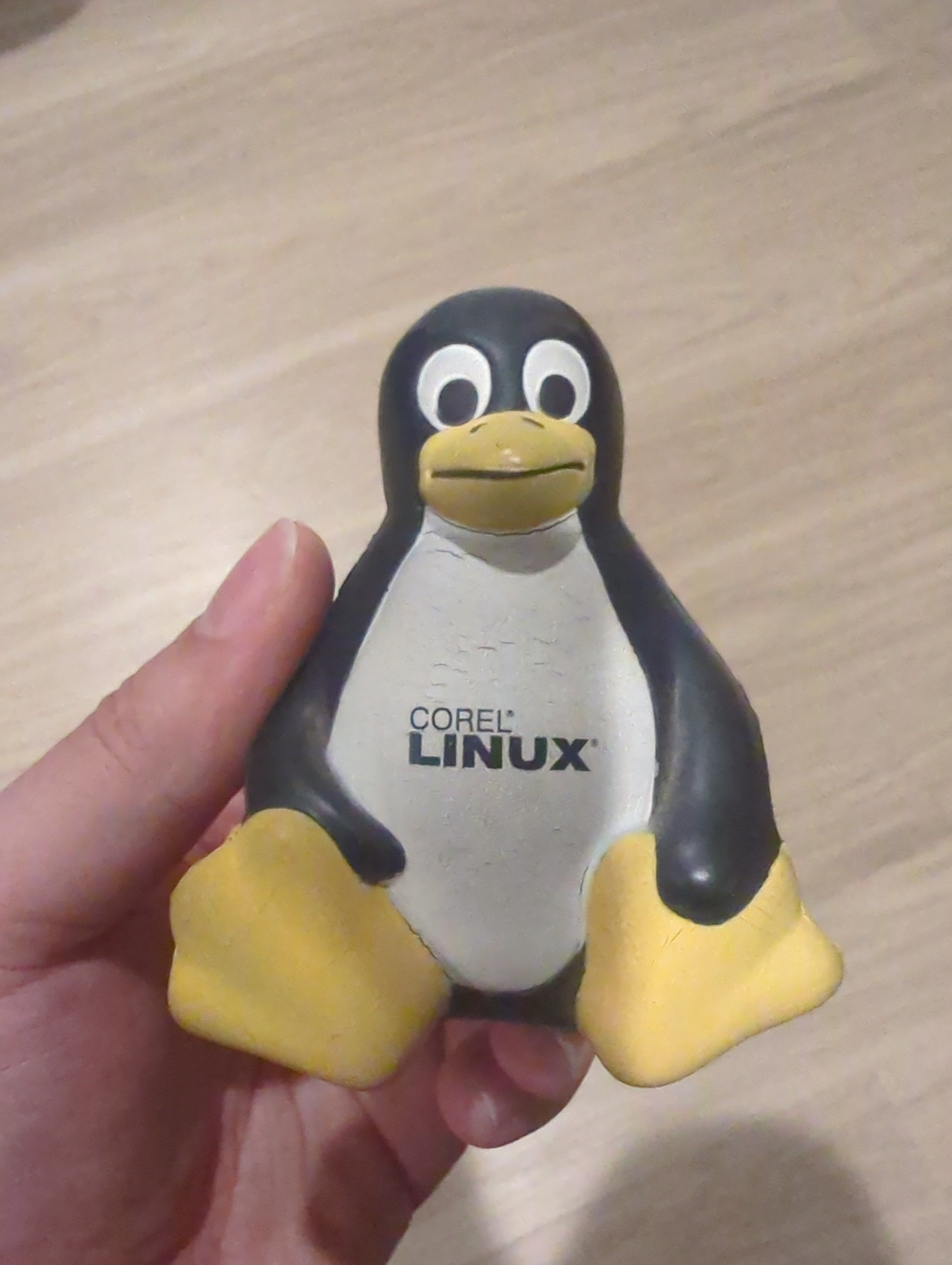This was my first exposure to Linux - one of the PCs in high school had it installed. (I had read about Linux before then, but not had a chance to try it)
It had a little foam Tux in the box, and I got to keep it:

I hope you use it for
duckpenguin debugging
The only flaw in Corel’s logic was that as soon as you’re running Linux, you lose all desire to run WordPerfect, and develop an irresistible need to align yourself with vim or emacs…
I remember that this existed, but I don’t remember why.
Corel was known for a drawing program and later for WordPerfect. They were never well known for their involvement with Linux.
Linux was the NFT or Blockchain or AI of 1999, so every tech company was jumping on board.
The sales pitch, as I remember, was that you could run your Wordperfect or CorelDraw shit on it, and not need to have Windows to use it and instead could join the future, which was Linux. Though, amusingly, their version of the future was running Windows binaries via Wine on Linux which, eh, okay but…
Of course, nobody used Wordperfect or CorelDraw at that point in history so I’m not entirely sure how that was supposed to sell you on buying not-Word and not-Photoshop.
WordPerfect continued to thrive in the legal industry for years to come due to its “reveal codes” feature and the way it counted words.
Here’s a post about that from 2008.
https://ask.metafilter.com/96820/Why-do-so-many-laywers-use-WordPerfect
Yeah, I’ve read about that. But, then again, the legal industry was probably exceedingly low on the likely-to-change-to-Linux probability list in 1999, as well. I’ve worked for some lawyers in the past and they’re a shockingly traditional dont-change-anything-ever group. (Not particularly shocking.)
Xorel was, and still is, used in a lot of industries, like signmaking, embroidery, etc. It has been losing share in the general vector graphics space for years though.
Honestly it wouldn’t be too incredibly crazy for them to make a Linux graphic suite. They could even start maintaining a Linux distro.
However this is would be high risk with a high chance of failure as Linux users don’t usually have big wallets unless you count enterprise servers
they were trying to make a windows alternative since microsoft was using their leverage w windows to make corel lose money and courts were doing little more than slapping microsoft on the wrist for doing it.
I find it reminiscent to what Valve is doing with SteamOS and Proton today. That is, establishing a viable alternative to MS Windows through using Wine/Proton in order to not be reliant on a competitor for running their software.
Just keep in mind that value can lock you in any day. Steam is proprietary after all.
We don’t need wildly successful companies. We need options and completion
Yeah, Bill Gates destroyed a lot of other companies with his OS monopoly, Dbase (Access) and Lotus 1 2 3 (Excel)…
and now he’s a “philanthropist”
emphasis on the quotes since he’s put his wealth into a charity; like most of the utlra wealth do; to avoid taxes so now he’s legally required to spent 5% of it in philanthropy.
Logged into GUI as root 🤣
The 90’s was a wild time…
Specially for people coming from windows, this was normal. The appeal of mandrake and corel and suse was this kind of graphical control panel à la windows where you needed root privileges in a graphical interface.
I myself didn’t learn about sudo until years later, and su just from debian 3.0.
Coming from Kali Linux, this is still normal
@cyberpunk007@lemmy.ca I don’t see what the big issue is…
It was a serious issue back then. People were wandering around on the Internet with root accounts. A lot of #linux IRC channels were kicking&banning anyone with “~root” or “root” ident with educational sentence like “Do not use root account as your ordinary account, check instructions”. We don’t see the issue widespread today since distros did very good intended “dark patterns” to push users to regular user accounts. Linux (or UNIX) “root” account is true god mode. E.g. infamous “rm” as root joke (!) could even affect Windows running WSL2, so MS had to implement special workarounds.
WSL has no direct connection to the host file system. WSL’s drives are virtualized. Which is a real fuckin peach when you just want to copy things to and fro and end up discovering this 😅
Dig deeper, it is even more crazy. They use Plan9’es protocol.
Anyone with physical access to the computer also has full file system access and could wipe everything, even without password or technical knowledge.
It’s bad for other reasons too, like a script on a website would launch as root… And also without a password if your disk was encrypted your data is protected even if someone has physical access.
It is just generally common knowledge to not run around in God mode all day, otherwise sudo wouldn’t exist.
@cyberpunk007@lemmy.ca
@lord_ryvan@ttrpg.network
This is running in a VM without any internet access… that will end up getting replaced by another OS anyway
Oh ya I kind of figured, I was just having a laugh 😂
@cyberpunk007@lemmy.ca
Yeah if it was on a real machine or if I was connecting to the internet I wouldn’t be logged in as root ^^;
I know 😂
That was my first linux distro I tried, took 12 minutes to boot on my Pentium 75 with 8mb RAM. Still better then win98 though
I’m surprised you could even run a Linux distro with X11 and KDE1 on 8MB of RAM.
Oh man, what a throwback! I had completely forgotten about this. It made a splash and then I never heard anything more about it. One of my coworkers installed it on his Toshiba laptop and ran it for a week or two before giving up.
why does it look so much like windows
@richardisaguy@lemmy.world It mainly competed against Windows 98 and Windows 2000 by Microsoft so I guess they were trying to jump on the hype with using a similar interface
Correct. Not just hype but to make it “Like Windows, but free”.
Even then it could be themed to a degree and some distros tried to look more like Windows than others.
looks like old school kde
TBF first time I saw KDE I called it “Can’t believe it’s not Windows” the DE.
It looks pretty kool, even if it looks very much like Windows
They nailed the retro-futurism aesthetic with that window UI
Please be advised that Corel Linux was discontinued in August 15, 2000. It is no longer be receiving any security patches.
@possiblylinux127@lemmy.zip As I said in a previous comment this is an emulator this is running in a VM
You should really update to something actively supported.
(My original comment was mostly a joke)
This was my first exposure to Linux. I had no internet at the time so I left it on my computer for a couple of weeks and played with the settings and Snake, then reinstalled Windows so I could play my games again.
I had to do a double take between this comment and the one by davidgro@lemmy.world
Omg I forgot Corel Linux ! I installed it 25 years ago, wow!
I wonder if this kibd of theme is still available for modern graphical toolkits like Qt6 or GTK4
My laptop looks very similar to this, running KDE Plasma 6.1, so yes, yes it is.
Great, now gimme!
Look up “Commonality”/“Commonality Sol” (theme), “Reactionary” (theme), and “GNUStep” (icons) on the Plasma theme library, I think you’ll find some stuff you like. Also, in Plasma Settings’ “Window Style”, select “MS Windows 9x”.
Heh, hadn’t seen KDE like this in ages, it’s been a while
Whoa, that’s early KDE? They really went all in on looking like contemporary Windows.
Qt1 came with two default themes. One of them mimicked Win95 and the other mimicked Motif. KDE1 defaulted to the former in order to look more familiar. To this day, the “Windows 9x” theme still ships with Qt and can be selected on any Plasma 6 install. Starting with KDE2 they started using their own custom themes for everything, tho.
GNOME 1 actually looked very similar, which isn’t surprising because its main goal at that point was to offer a replacement for KDE that didn’t depend on then-proprietary Qt. GNOME 2 and KDE 2 is when they really started building a distinct identity.
*CDE
My first linux distro.







